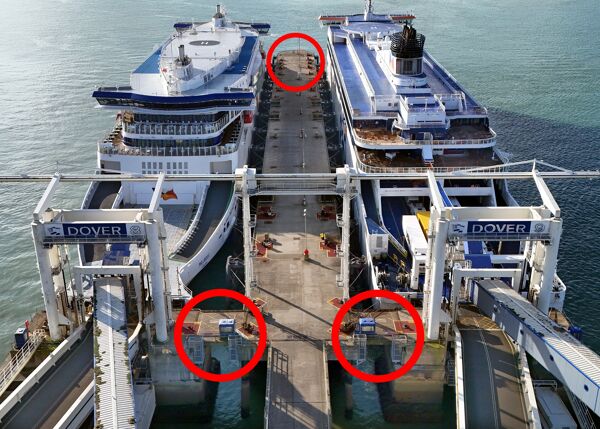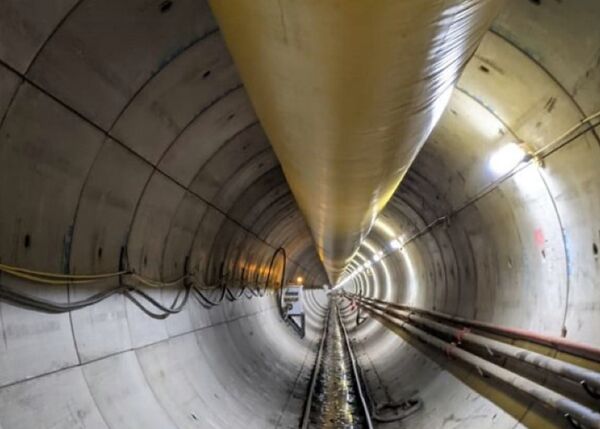
NEC4 contracts have been used to protect critically endangered European eels from swimming into water treatment plants in southern England. Client Southern Water let a £10.4 million programme of five eel screens to framework contractor Trant Engineering Limited in September 2019. Each screen was procured using an NEC4 Engineering and Construction Short Contract (ECSC).
Following initial design work by Trant Engineering Limited under a pre-construction services agreement, the first screen at Hardham on the River Arun in West Sussex was installed in February 2021. The final and largest contract at Yalding on the River Medway in Kent was let in January 2019. The screen was installed in January 2022 and the £3 million scheme was completed on time and within budget in May 2022.
The lessons learned on earlier screens were put to good use at Yalding, which is Southern Water’s largest surface water abstraction site. The solution involved fabricating five 7 m long, 2 mm mesh screens and retrofitting them into the existing 200 m long inlet channel while temporarily blocking the flow with a portadam. Considerable civil engineering works were required, including extending the inlet apron and heavily modifying the existing wing walls.
Bespoke ancillary equipment installed at Yalding included a wash water system, motor control centre, high and low-level access walkways and further equipment to enable the screens to be self-maintaining. The screens are also designed to be lifted from 72° to 90° to allow access for cleaning using a retractable skip and platform within the intake.
MUTUAL TRUST AND CO-OPERATION
Southern Water Services associate project manager Kev Fausset says the project team epitomised the notion of working in NEC’s required, ‘spirit of mutual trust and co-operation’. ‘Amongst the plethora of adages and proverbs used during the project, one statement echoed throughout and stuck with all: it was ‘we can’, and we did. The NEC guided the entirety of the programme using a model which yielded immensely positive results.’
He says the early success and pace of the programme could only be achieved though NEC’s collaborative approach being embraced from the outset of each scheme. ‘Examples included introducing each scheme and its background to the contractor prior to entering into contract. We jointly drafted the scopes for each contract as part of the pre-contract service agreement, which was then subsumed into the individual NEC4 ECSC Option A contract. The contractor also contacted its supply chain in advance to help with developing solutions and confirming their availability to deliver.'
Fausset says the project team accepted the eventuality of NEC compensation events for fairly compensating the contractor for unknown risks carried by the client. ‘We operated based on current knowns, and allowed unknowns to be identified as risks and issued to the appropriate party to manage. We added a Z clause to the contract to capture the assumptions and qualifications provided.’
COLLABORATIVE WORKING
Challenges faced by the team included the global steel shortage brought on by the Covid-19 pandemic. ‘Through open conversations across the team, we were able to make advanced payments to accelerate the manufacture of the screens despite no designs being developed at that stage,’ says Fausset. ‘This NEC-inspired collaborative working mitigated the impact of the steel shortage.’
He says as the project had developed at such significant pace, there remained a number of aspects which were being designed as construction progressed that required client input or acceptance. ‘This would only have been possible with the application of NEC contract processes, including appropriate use of early warning notices and timely responses to requests for information. If a delay was set to impact the delivery against the regulatory date, an urgent escalation was initiated with appropriate service level agreements.’
Fausset says for each early warning, on site meetings were quickly held to review the solution then and there. ‘The principal engineers who were in a position to accept designs and changes were added to meetings remotely via Teams and virtually walked the site with the project team. We also made a distinction between delays impacting the programme and those which would not. This was only possible thanks to the NEC requirement to maintain an up-to-date accepted programme, which allowed us to focus our limited resources on what mattered most.‘
He concludes, ‘The successfully application of NEC4 contracts on this programme guided a team which trusted one another and who consequently delivered five years’ worth of work in just 18 months. The pressure brought the team together, while the contracts united them and allowed this monumental achievement.’
BENEFITS OF USING NEC
- NEC’s requirement to act in a, ‘spirit of mutual trust and co-operation,’ was embraced by the project team and led to a ‘we can’ approach, delivering 5 years of schemes in just 18 months.
- NEC flexibility allowed an additional Z clause to be added to capture assumptions and qualifications about the allocation of unknown risks, ensuring clarity on compensation events.
- NEC early warning mechanism ensured that potential delays such as design approvals were quickly identified and collaboratively resolved.
- NEC requirement to maintain an up-to-date accepted programme enabled limited resources to be focused on issues that would actually delay completion.



